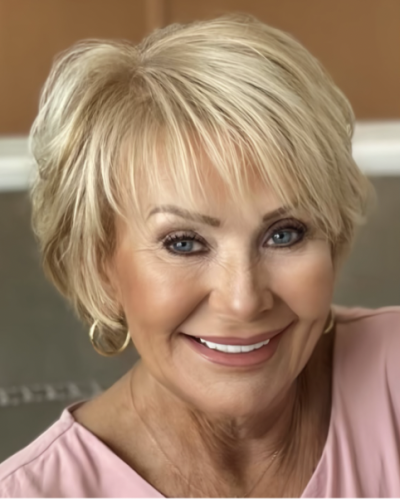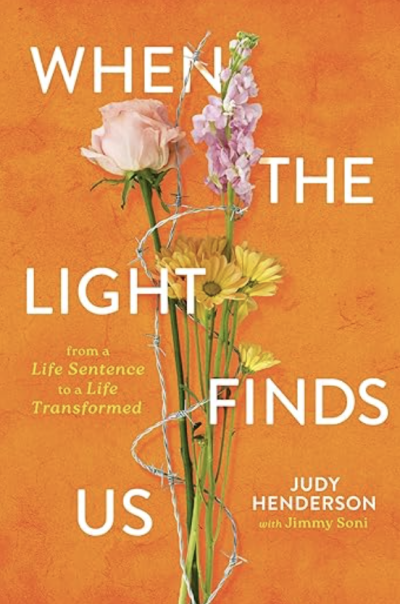Wrongfully imprisoned for 36 years, Christian mother shares how God redeemed injustice

In a Missouri prison visiting room in 2017, Judy Henderson collapsed to her knees.
The then-60-year-old woman had spent 36 years behind bars, serving a life sentence without parole for a crime she didn't commit. But on this day, tears streamed down her face as Gov. Eric Greitens stood behind her, delivering news that would make history in Missouri: she was being granted clemency.
“He just took me by the shoulders and he said, ‘Judy, it’s good news. It’s good news for you,’” Henderson told The Christian Post. “He said, ‘Today, I’m going to commute your sentence to time served, immediate release.’ And I still get chills just thinking about it because I can visualize how that was, how that felt.”
Henderson’s new memoir,When the Light Finds Us,chronicles a devastating miscarriage of justice and a journey of spiritual reckoning, resilience and remarkable grace.

The book opens with Henderson’s rawest memory of all: the moment she was convicted.
“I can't even put in words the devastation that you feel knowing your life has just been taken,” Henderson said. “Especially whenever you hear your mother wailing in the background and you can't hold her, you can't touch her. You can't comfort her in any way. But I knew at that moment I had to be strong.”
Henderson was a business owner, mother and the eldest of eight children when her life unraveled. A survivor of domestic violence and emotional trauma, she was conditioned, by what she termed a “generational curse,” to endure abuse and seek peace through submission. After divorcing her husband to protect her two young children, Henderson entered a vulnerable period that would prove fateful.
“I was already mentally conditioned to want this white little picket fence,” she said. “Then I met my co-defendant […] he was suave and debonair, very polite, very convincing. And I had no idea […] that there was this other side of him that was even capable of doing such a thing.”
In her book, she recounts how she was manipulated by her boyfriend into robbing a jeweler in Springfield, Missouri. However, the robbery turned deadly when the jeweler refused to give them a ring and other valuables. Henderson’s boyfriend fired a gun several times, killing the jeweler and injuring her.
Both were charged with murder, but only Henderson was found guilty. A central issue in her trial — a conflict of interest — was later deemed unconstitutional: Henderson and her co-defendant shared the same attorney.
“I went to trial first, so I could not take the stand and be honest and tell the truth about this because it would hurt his other client,” she explained. “You can’t give one a fair trial and not the other one.”
What followed was a slow death sentence: life without parole for 50 years for capital murder. Henderson entered prison in a fog of disbelief and rage, feeling as though she’d landed in a foreign country where the language, customs and expectations were unfamiliar.
“I was very, very angry to begin with. … God and I had to come to terms with a lot of different things,” she shared. But everything began to change during a three-day Christian retreat offered to a small group of lifers.
“God speaks of love in the Bible. He loved us so much that He died for us. Whenever I saw the enormity of how much love was in this three-day retreat, and how these volunteers […] didn’t have to give up their time to come in there and speak with us […] They chose to do this because they had the love of God in them, and that gave me hope.”

It wasn’t an easy path — “I’m not going to just sit here and paint this great little picture. It wasn’t great,” she said — but it was transformative.
She recommitted her life to Christ and found deep resonance in Jeremiah 29:11, a verse she kept above her cell mirror for decades: “For I know the plans I have for you … plans to give you a future and a hope.”
“I knew prison was not what God had planned for me,” she said. “But while I was there, He had a purpose.”
That purpose, she believes, was to become a light to others still in the darkness of incarceration.
In prison, she became a certified paralegal and mentor for others incarcerated. She became a certified dog trainer, a certified personal and group fitness trainer from AFAA and a certified hairdresser. Eventually, she became an advocate for legislative reform, leading efforts to ensure that battered women could use their histories of abuse as legal defense.
Henderson's advocacy work led to landmark legislation recognizing battered women's syndrome as a legal defense in Missouri.
“You can either get bitter, or you can get better,” she reflected. "I chose better because the anger was only hurting me; it didn't bother anybody else. Nobody in that prison cared that I was angry. Everybody was angry. That was a common emotion, and I had to raise myself up with the help of Jesus Christ, and I had to believe that He already gave me all the tools that I would need the day He created me to navigate through whatever was put in my path.”
Today, she works with women recently released from prison, helping them find housing, reunite with their children and begin again.
“That’s what my mission is. That’s what my purpose is. … I will do that until the day I take my last breath.”
Henderson stressed her book isn’t simply about wrongful incarceration but a story of radical forgiveness. She emphasized she harbors no ill will toward the man who deceived her, nor the system that imprisoned her.
“God forgave us. He died on the cross and suffered enormously for us,” she said. “How could I not, loving Him as my Father, also forgive others as He did?”
Her ability to forgive is not naïve; it’s born from hard-won clarity and a fierce refusal to let bitterness define her.
“I did not want Satan to think that he had that kind of power over me,” she said. “I did not want bitter.”
The book’s title, along with its cover art of a flower blooming through barbed wire, is a metaphor for that journey, she said.
“Light to me symbolizes freedom,” she explained. “I was in such darkness for so many years without even realizing it. And then whenever I was sent into prison […] that is one of the darkest places you can be.”
Still, the light found her. And through her writing, work and faith, Henderson, now a grandmother, helps guide others toward that same freedom only available through Christ.
“Don’t give up hope. Sometimes, we just have to listen for His voice. You can’t keep going in the same direction if you keep running into roadblocks. That is your sign. Go in a different direction. Let Him show you.”
Leah M. Klett is a reporter for The Christian Post. She can be reached at: leah.klett@christianpost.com





























